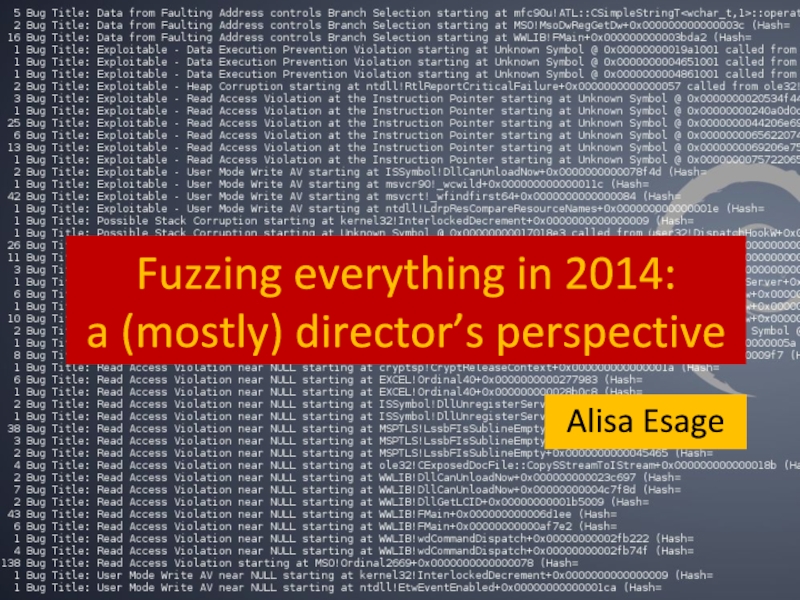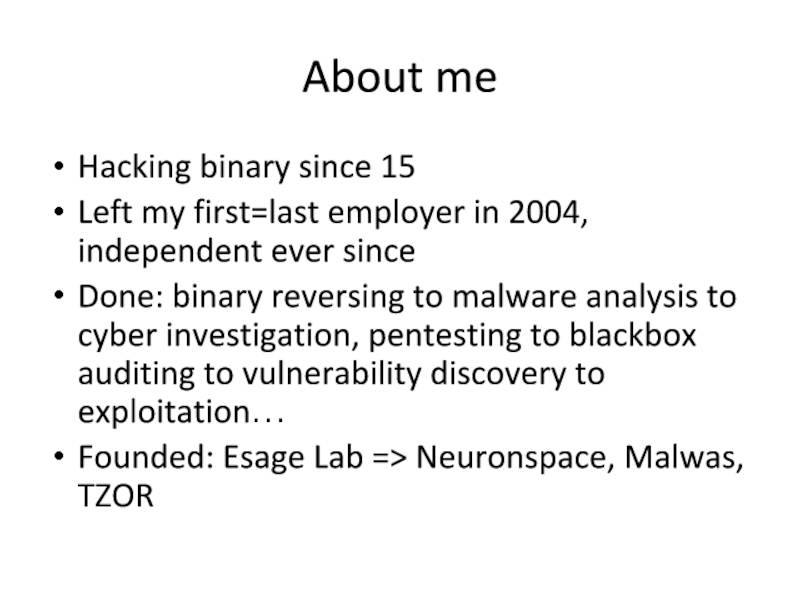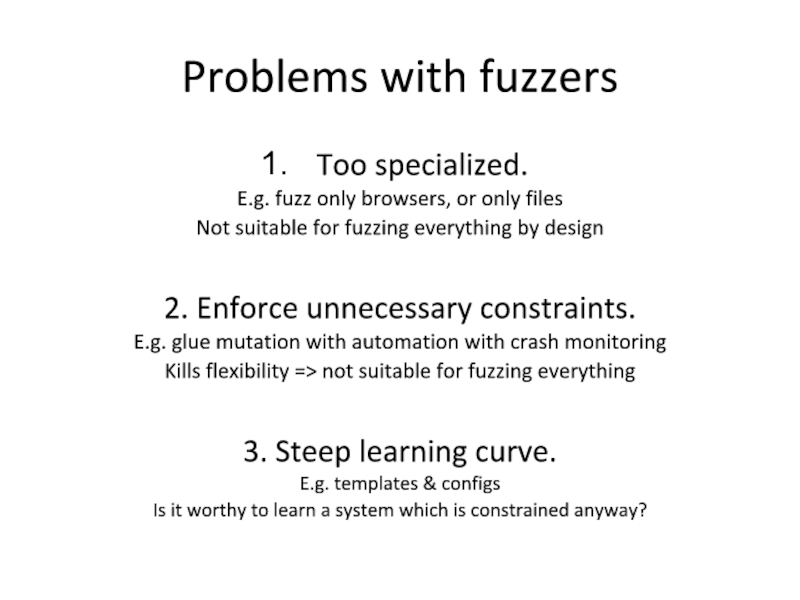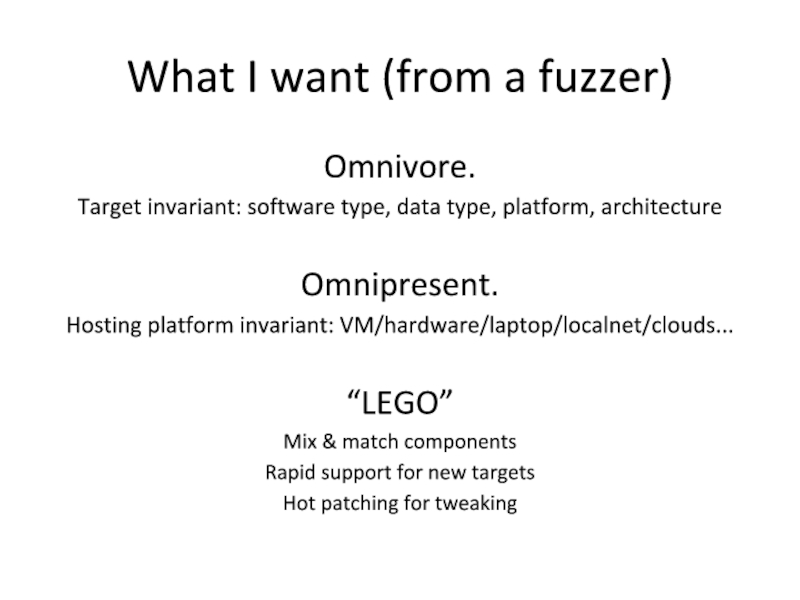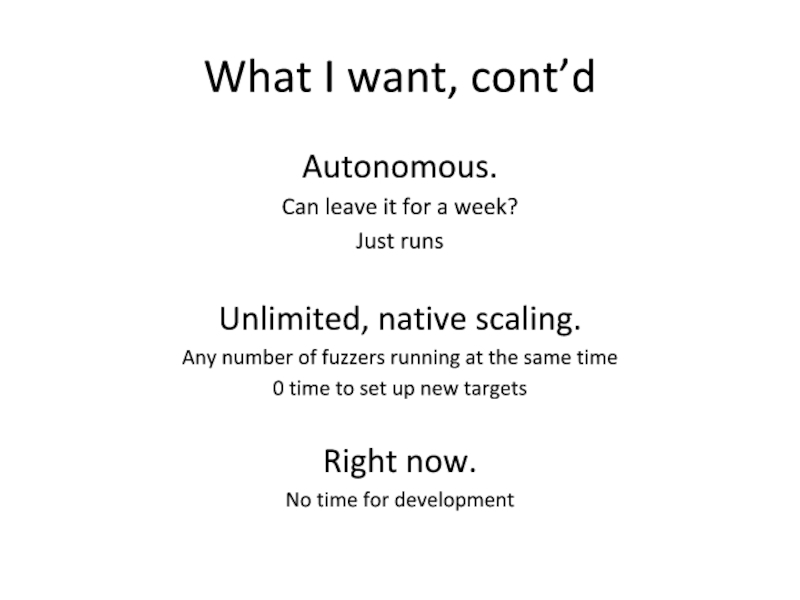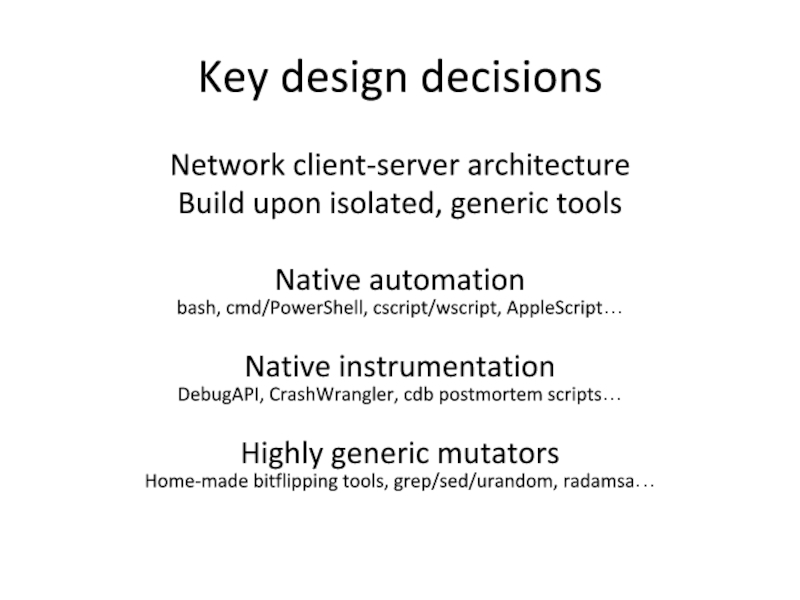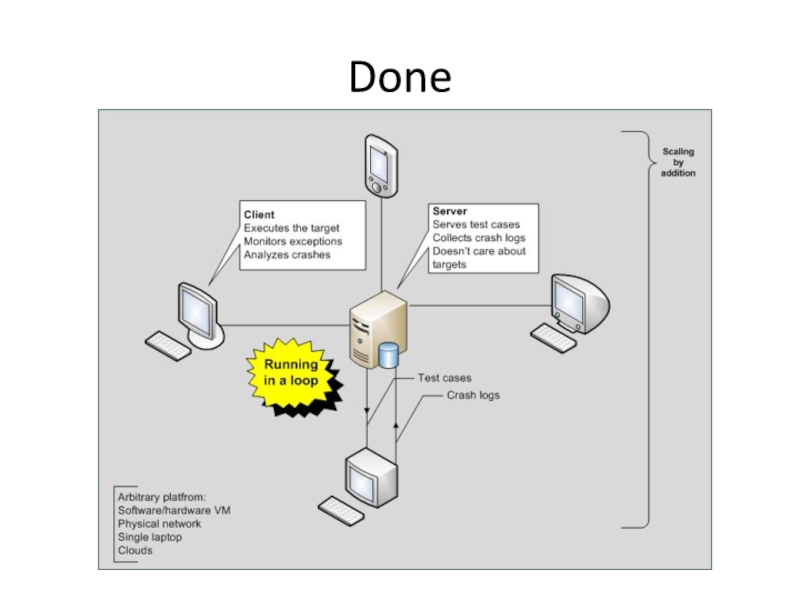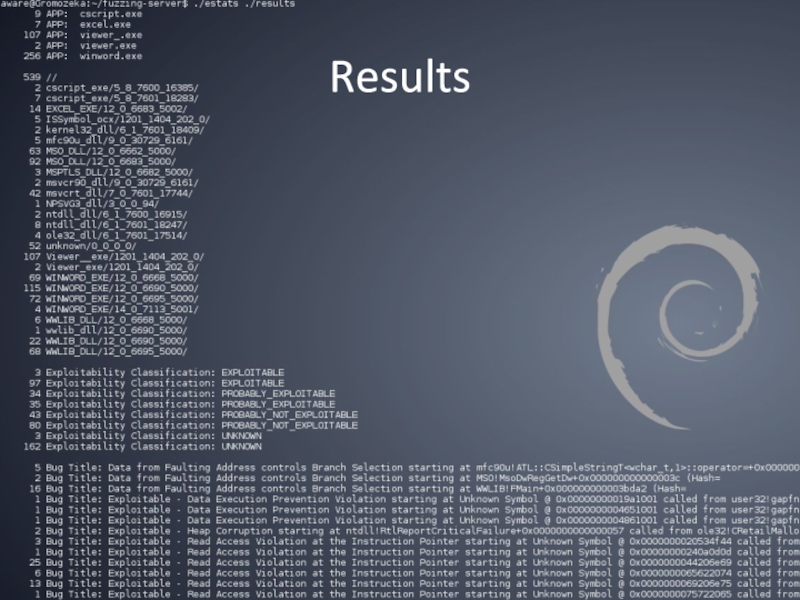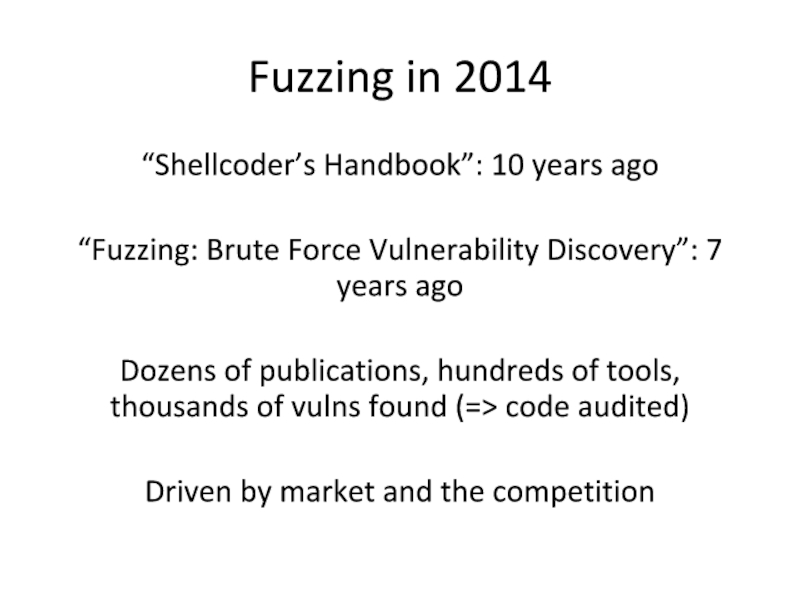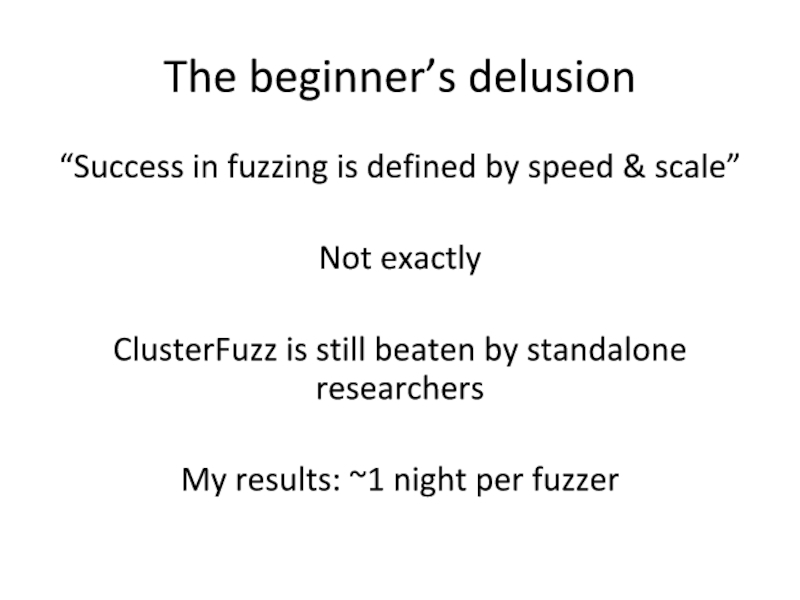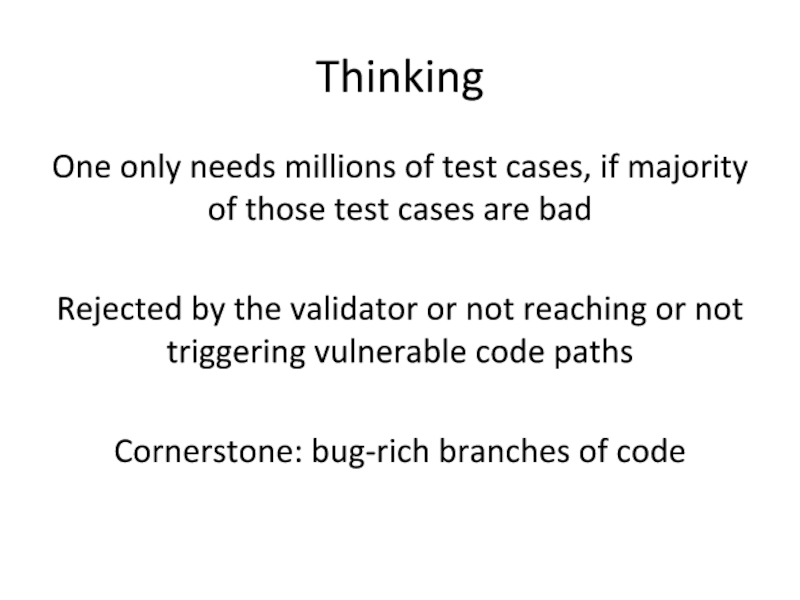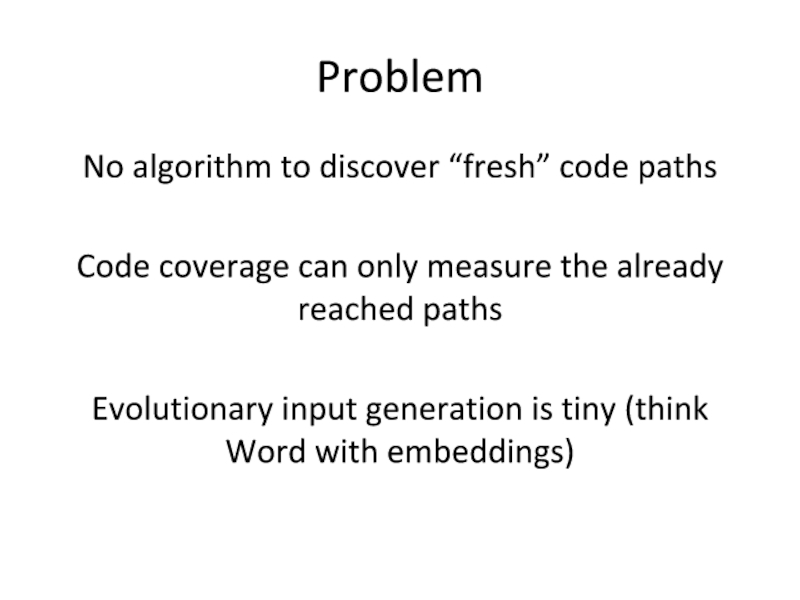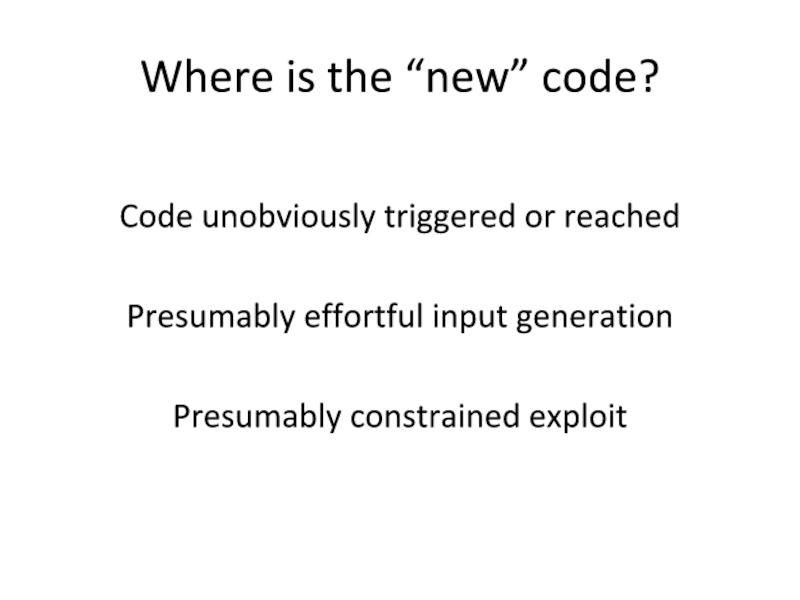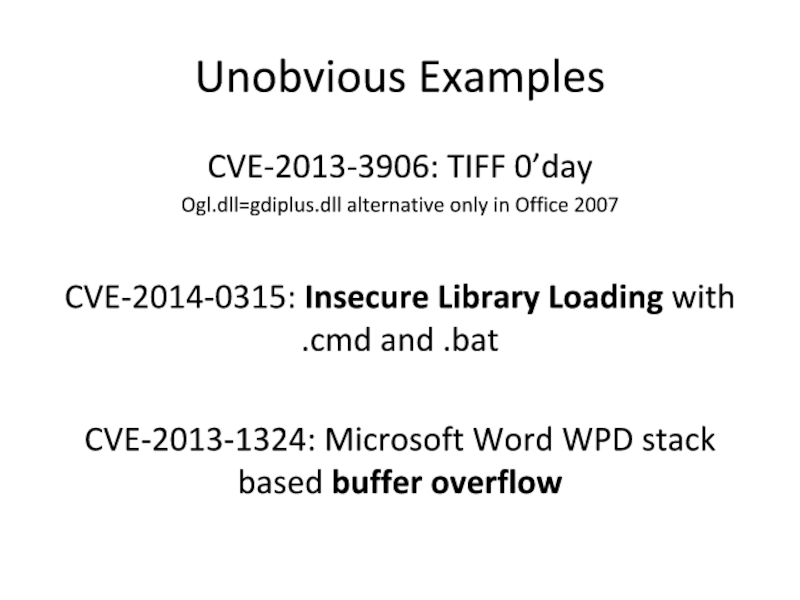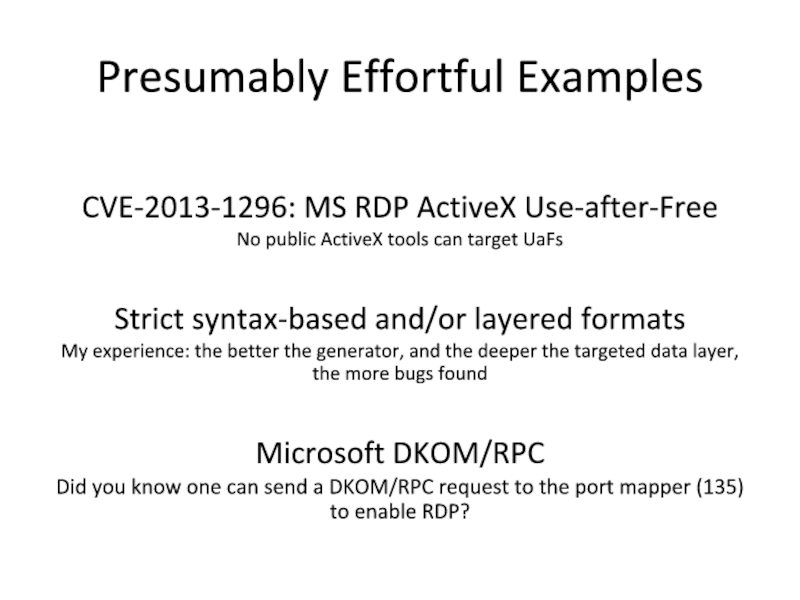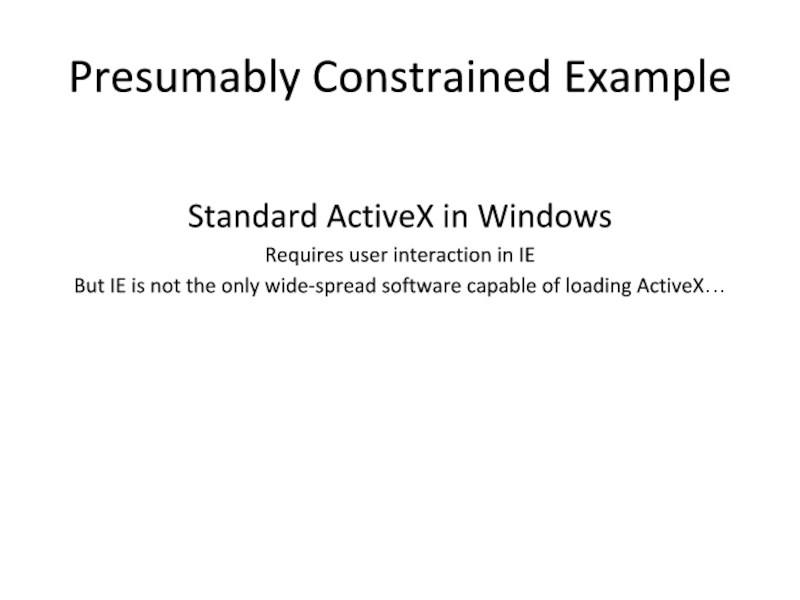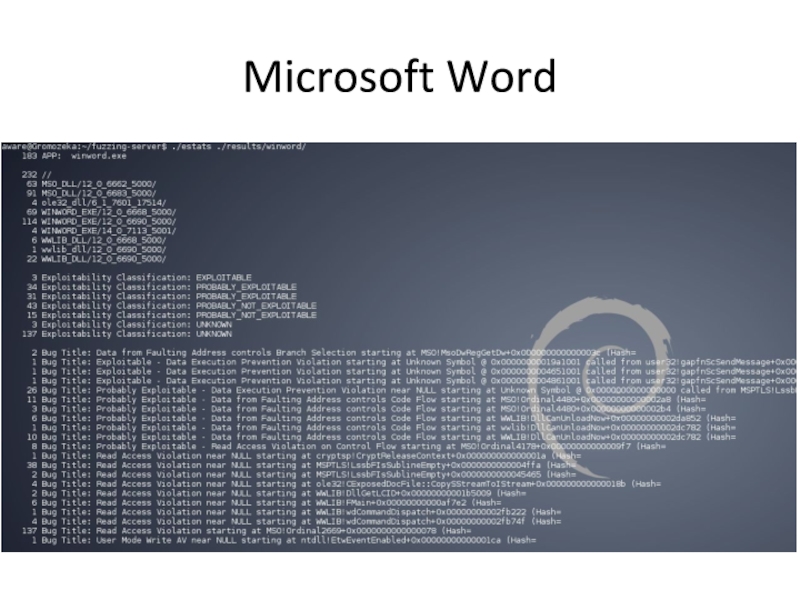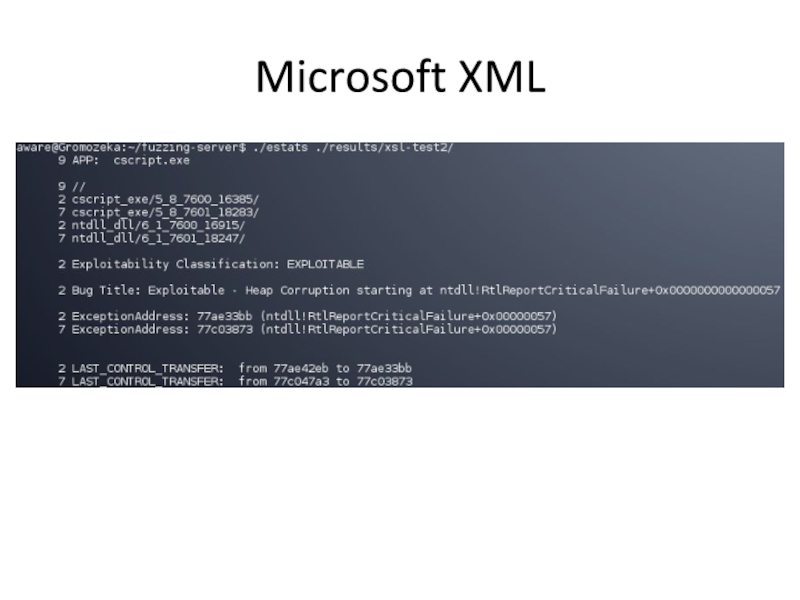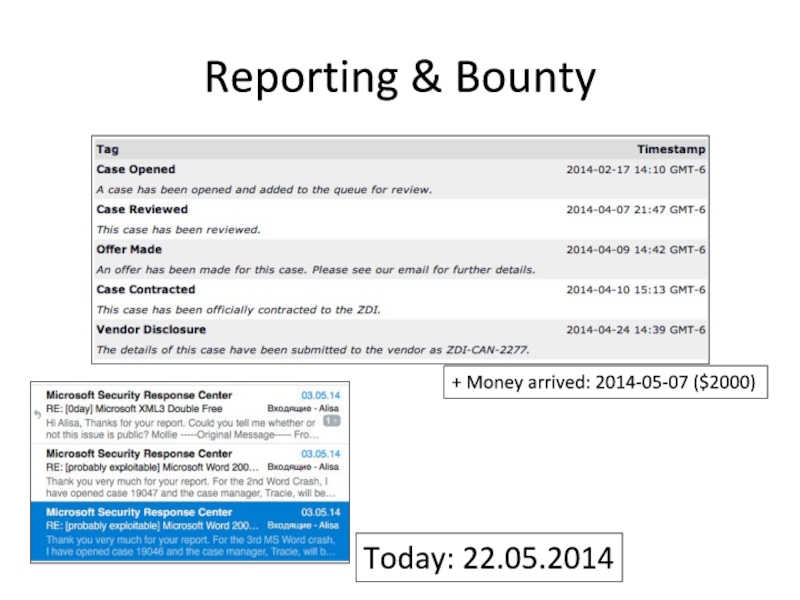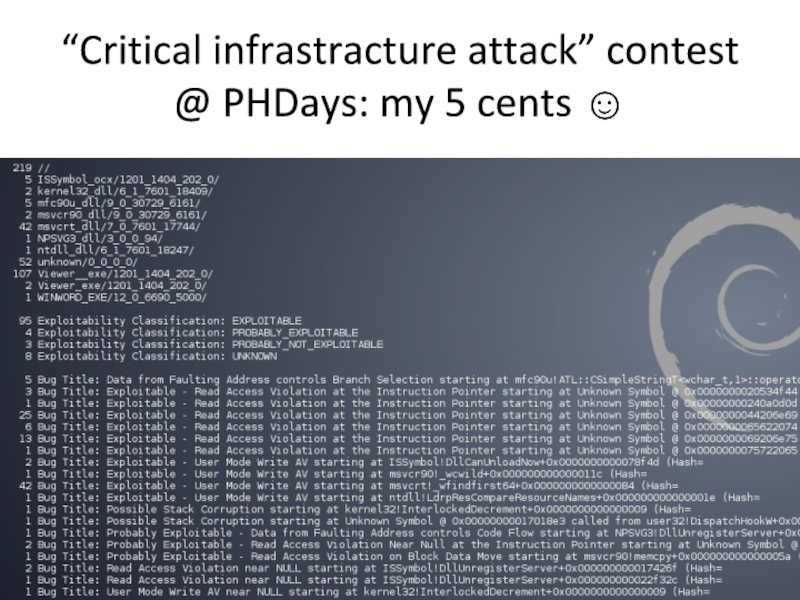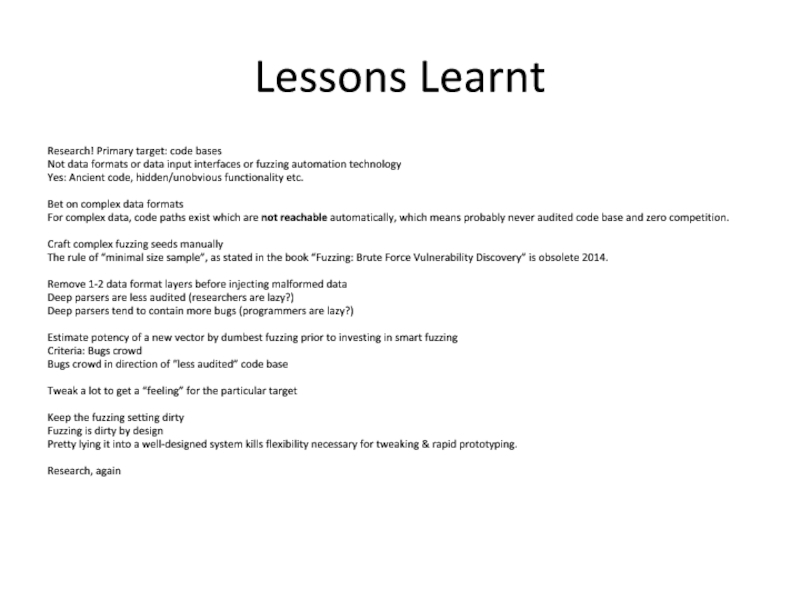- Главная
- Разное
- Дизайн
- Бизнес и предпринимательство
- Аналитика
- Образование
- Развлечения
- Красота и здоровье
- Финансы
- Государство
- Путешествия
- Спорт
- Недвижимость
- Армия
- Графика
- Культурология
- Еда и кулинария
- Лингвистика
- Английский язык
- Астрономия
- Алгебра
- Биология
- География
- Детские презентации
- Информатика
- История
- Литература
- Маркетинг
- Математика
- Медицина
- Менеджмент
- Музыка
- МХК
- Немецкий язык
- ОБЖ
- Обществознание
- Окружающий мир
- Педагогика
- Русский язык
- Технология
- Физика
- Философия
- Химия
- Шаблоны, картинки для презентаций
- Экология
- Экономика
- Юриспруденция
Fuzzing everything in 2014 презентация
Содержание
- 1. Fuzzing everything in 2014
- 2. About me Hacking binary since 15 Left
- 3. A BIT AWAY FROM A 0-DAY… Section 1: hacker’s
- 4. Microsoft Word 2007/2010 E
- 5. THE IDEAL FUZZER Section 2: engineer’s
- 6. Problems with fuzzers Too specialized. E.g. fuzz
- 7. What I want (from a fuzzer) Omnivore.
- 8. What I want, cont’d Autonomous. Can leave
- 9. Key design decisions Network client-server architecture Build
- 10. Done
- 11. Results
- 12. THE MAGIC Section 3: director’s
- 13. Fuzzing in 2014 “Shellcoder’s Handbook”: 10 years
- 14. The beginner’s delusion “Success in fuzzing is
- 15. Thinking One only needs millions of test
- 16. Problem No algorithm to discover “fresh” code
- 17. Where is the “new” code? Code
- 18. Unobvious Examples CVE-2013-3906: TIFF 0’day Ogl.dll=gdiplus.dll alternative
- 19. Presumably Effortful Examples CVE-2013-1296: MS RDP
- 20. Presumably Constrained Example Standard ActiveX in
- 21. RESULTS Section 4: sponsor’s ☺
- 22. Microsoft Word
- 23. Microsoft XML
- 24. Reporting & Bounty Today: 22.05.2014 + Money arrived: 2014-05-07 ($2000)
- 25. “Critical infrastracture attack” contest @ PHDays: my 5 cents ☺
- 26. Lessons Learnt Research! Primary target: code bases
- 27. Thank you!
Слайд 2About me
Hacking binary since 15
Left my first=last employer in 2004, independent
ever since
Done: binary reversing to malware analysis to cyber investigation, pentesting to blackbox auditing to vulnerability discovery to exploitation…
Founded: Esage Lab => Neuronspace, Malwas, TZOR
Done: binary reversing to malware analysis to cyber investigation, pentesting to blackbox auditing to vulnerability discovery to exploitation…
Founded: Esage Lab => Neuronspace, Malwas, TZOR
Слайд 6Problems with fuzzers
Too specialized.
E.g. fuzz only browsers, or only files
Not suitable
for fuzzing everything by design
2. Enforce unnecessary constraints.
E.g. glue mutation with automation with crash monitoring
Kills flexibility => not suitable for fuzzing everything
3. Steep learning curve.
E.g. templates & configs
Is it worthy to learn a system which is constrained anyway?
2. Enforce unnecessary constraints.
E.g. glue mutation with automation with crash monitoring
Kills flexibility => not suitable for fuzzing everything
3. Steep learning curve.
E.g. templates & configs
Is it worthy to learn a system which is constrained anyway?
Слайд 7What I want (from a fuzzer)
Omnivore.
Target invariant: software type, data type,
platform, architecture
Omnipresent.
Hosting platform invariant: VM/hardware/laptop/localnet/clouds...
“LEGO”
Mix & match components
Rapid support for new targets
Hot patching for tweaking
Omnipresent.
Hosting platform invariant: VM/hardware/laptop/localnet/clouds...
“LEGO”
Mix & match components
Rapid support for new targets
Hot patching for tweaking
Слайд 8What I want, cont’d
Autonomous.
Can leave it for a week?
Just runs
Unlimited, native
scaling.
Any number of fuzzers running at the same time
0 time to set up new targets
Right now.
No time for development
Any number of fuzzers running at the same time
0 time to set up new targets
Right now.
No time for development
Слайд 9Key design decisions
Network client-server architecture
Build upon isolated, generic tools
Native automation
bash, cmd/PowerShell,
cscript/wscript, AppleScript…
Native instrumentation
DebugAPI, CrashWrangler, cdb postmortem scripts…
Highly generic mutators
Home-made bitflipping tools, grep/sed/urandom, radamsa…
Native instrumentation
DebugAPI, CrashWrangler, cdb postmortem scripts…
Highly generic mutators
Home-made bitflipping tools, grep/sed/urandom, radamsa…
Слайд 13Fuzzing in 2014
“Shellcoder’s Handbook”: 10 years ago
“Fuzzing: Brute Force Vulnerability Discovery”:
7 years ago
Dozens of publications, hundreds of tools, thousands of vulns found (=> code audited)
Driven by market and the competition
Dozens of publications, hundreds of tools, thousands of vulns found (=> code audited)
Driven by market and the competition
Слайд 14The beginner’s delusion
“Success in fuzzing is defined by speed & scale”
Not exactly
ClusterFuzz is still beaten by standalone researchers
My results: ~1 night per fuzzer
Слайд 15Thinking
One only needs millions of test cases, if majority of those
test cases are bad
Rejected by the validator or not reaching or not triggering vulnerable code paths
Cornerstone: bug-rich branches of code
Rejected by the validator or not reaching or not triggering vulnerable code paths
Cornerstone: bug-rich branches of code
Слайд 16Problem
No algorithm to discover “fresh” code paths
Code coverage can only measure
the already reached paths
Evolutionary input generation is tiny (think Word with embeddings)
Evolutionary input generation is tiny (think Word with embeddings)
Слайд 17Where is the “new” code?
Code unobviously triggered or reached
Presumably effortful input
generation
Presumably constrained exploit
Presumably constrained exploit
Слайд 18Unobvious Examples
CVE-2013-3906: TIFF 0’day
Ogl.dll=gdiplus.dll alternative only in Office 2007
CVE-2014-0315: Insecure Library
Loading with .cmd and .bat
CVE-2013-1324: Microsoft Word WPD stack based buffer overflow
CVE-2013-1324: Microsoft Word WPD stack based buffer overflow
Слайд 19Presumably Effortful Examples
CVE-2013-1296: MS RDP ActiveX Use-after-Free
No public ActiveX tools can
target UaFs
Strict syntax-based and/or layered formats
My experience: the better the generator, and the deeper the targeted data layer, the more bugs found
Microsoft DKOM/RPC
Did you know one can send a DKOM/RPC request to the port mapper (135) to enable RDP?
Strict syntax-based and/or layered formats
My experience: the better the generator, and the deeper the targeted data layer, the more bugs found
Microsoft DKOM/RPC
Did you know one can send a DKOM/RPC request to the port mapper (135) to enable RDP?
Слайд 20Presumably Constrained Example
Standard ActiveX in Windows
Requires user interaction in IE
But IE
is not the only wide-spread software capable of loading ActiveX…
Слайд 26Lessons Learnt
Research! Primary target: code bases
Not data formats or data input
interfaces or fuzzing automation technology
Yes: Ancient code, hidden/unobvious functionality etc.
Bet on complex data formats
For complex data, code paths exist which are not reachable automatically, which means probably never audited code base and zero competition.
Craft complex fuzzing seeds manually
The rule of “minimal size sample”, as stated in the book “Fuzzing: Brute Force Vulnerability Discovery” is obsolete 2014.
Remove 1-2 data format layers before injecting malformed data
Deep parsers are less audited (researchers are lazy?)
Deep parsers tend to contain more bugs (programmers are lazy?)
Estimate potency of a new vector by dumbest fuzzing prior to investing in smart fuzzing
Criteria: Bugs crowd
Bugs crowd in direction of “less audited” code base
Tweak a lot to get a “feeling” for the particular target
Keep the fuzzing setting dirty
Fuzzing is dirty by design
Pretty lying it into a well-designed system kills flexibility necessary for tweaking & rapid prototyping.
Research, again
Yes: Ancient code, hidden/unobvious functionality etc.
Bet on complex data formats
For complex data, code paths exist which are not reachable automatically, which means probably never audited code base and zero competition.
Craft complex fuzzing seeds manually
The rule of “minimal size sample”, as stated in the book “Fuzzing: Brute Force Vulnerability Discovery” is obsolete 2014.
Remove 1-2 data format layers before injecting malformed data
Deep parsers are less audited (researchers are lazy?)
Deep parsers tend to contain more bugs (programmers are lazy?)
Estimate potency of a new vector by dumbest fuzzing prior to investing in smart fuzzing
Criteria: Bugs crowd
Bugs crowd in direction of “less audited” code base
Tweak a lot to get a “feeling” for the particular target
Keep the fuzzing setting dirty
Fuzzing is dirty by design
Pretty lying it into a well-designed system kills flexibility necessary for tweaking & rapid prototyping.
Research, again
